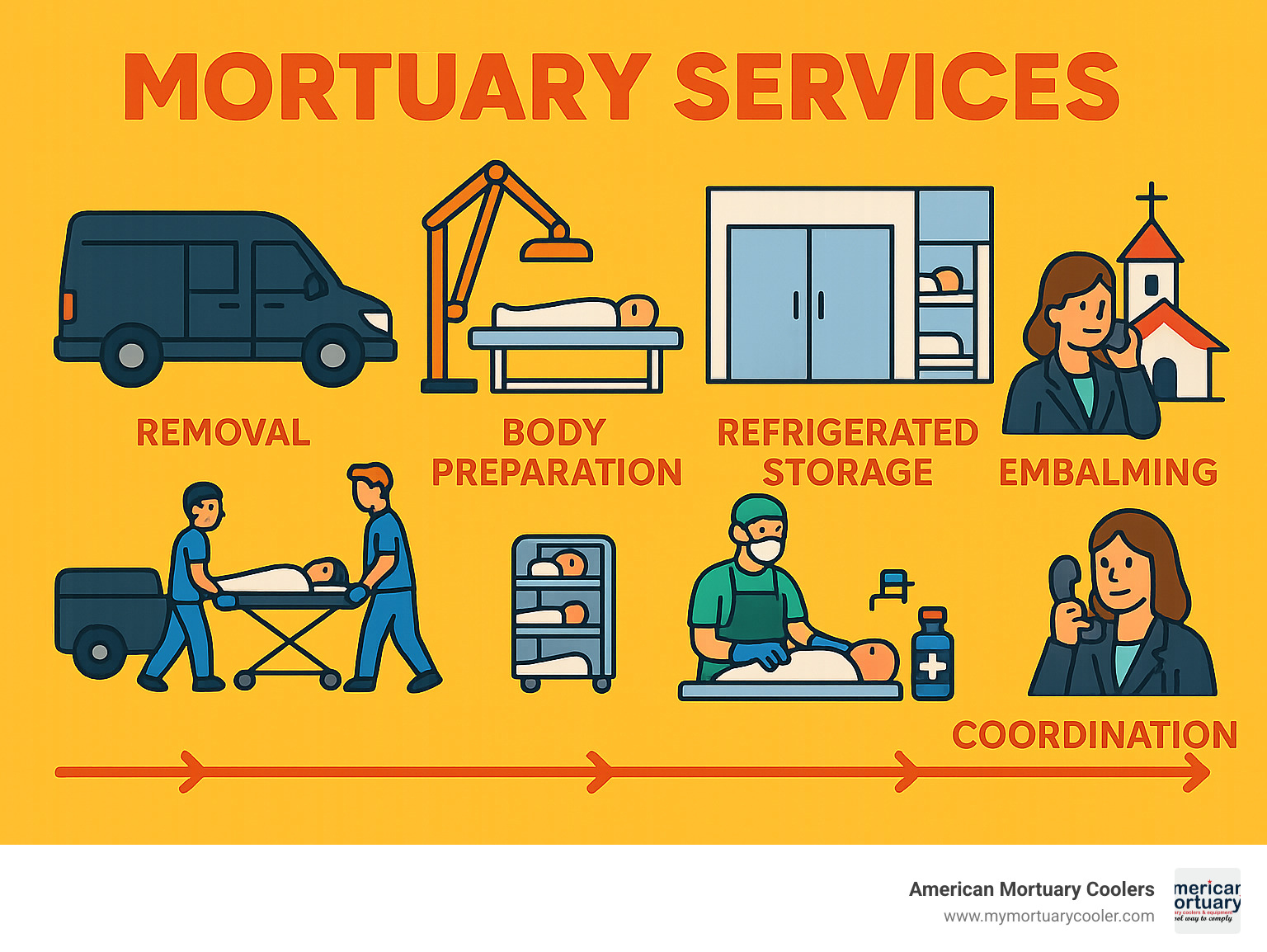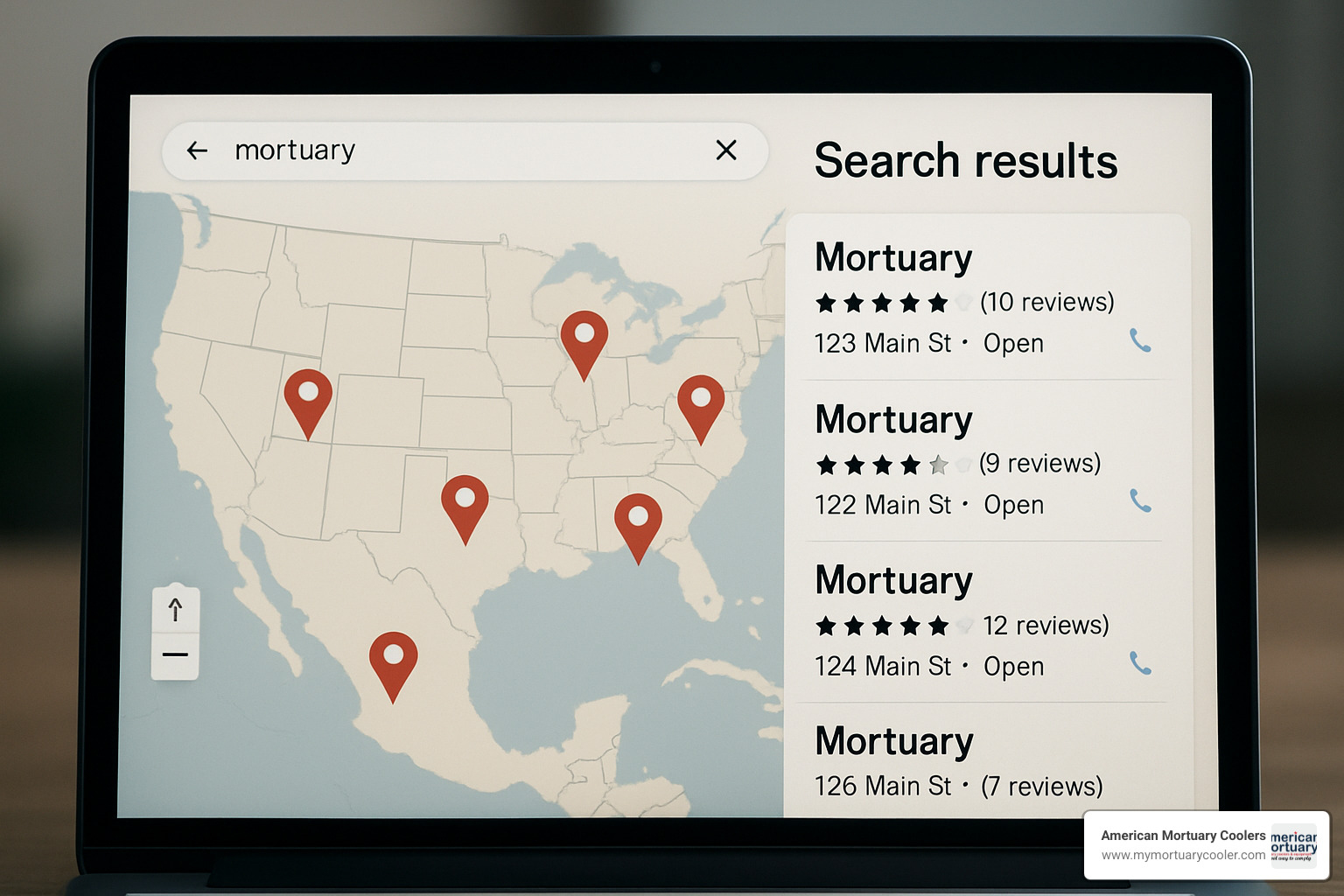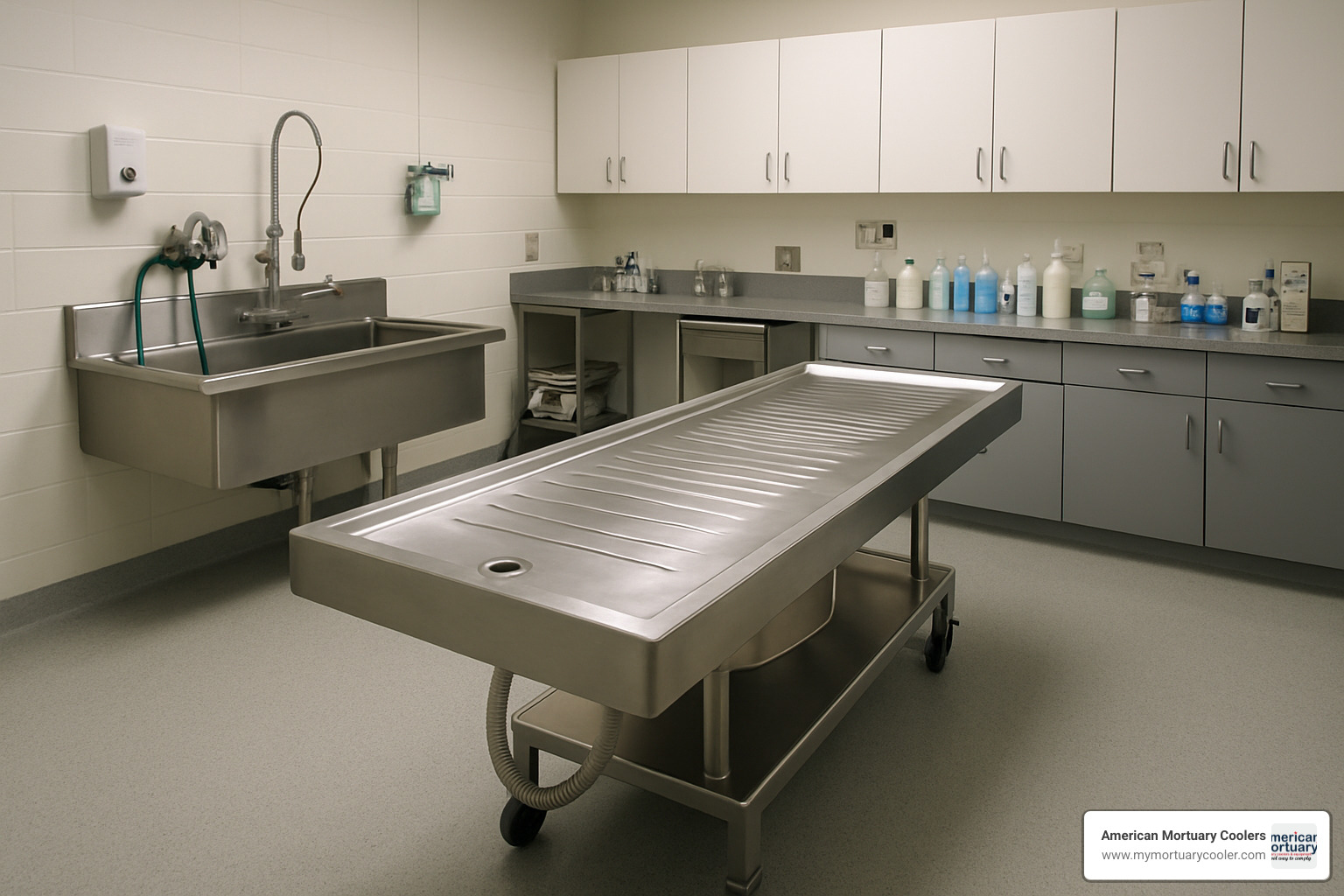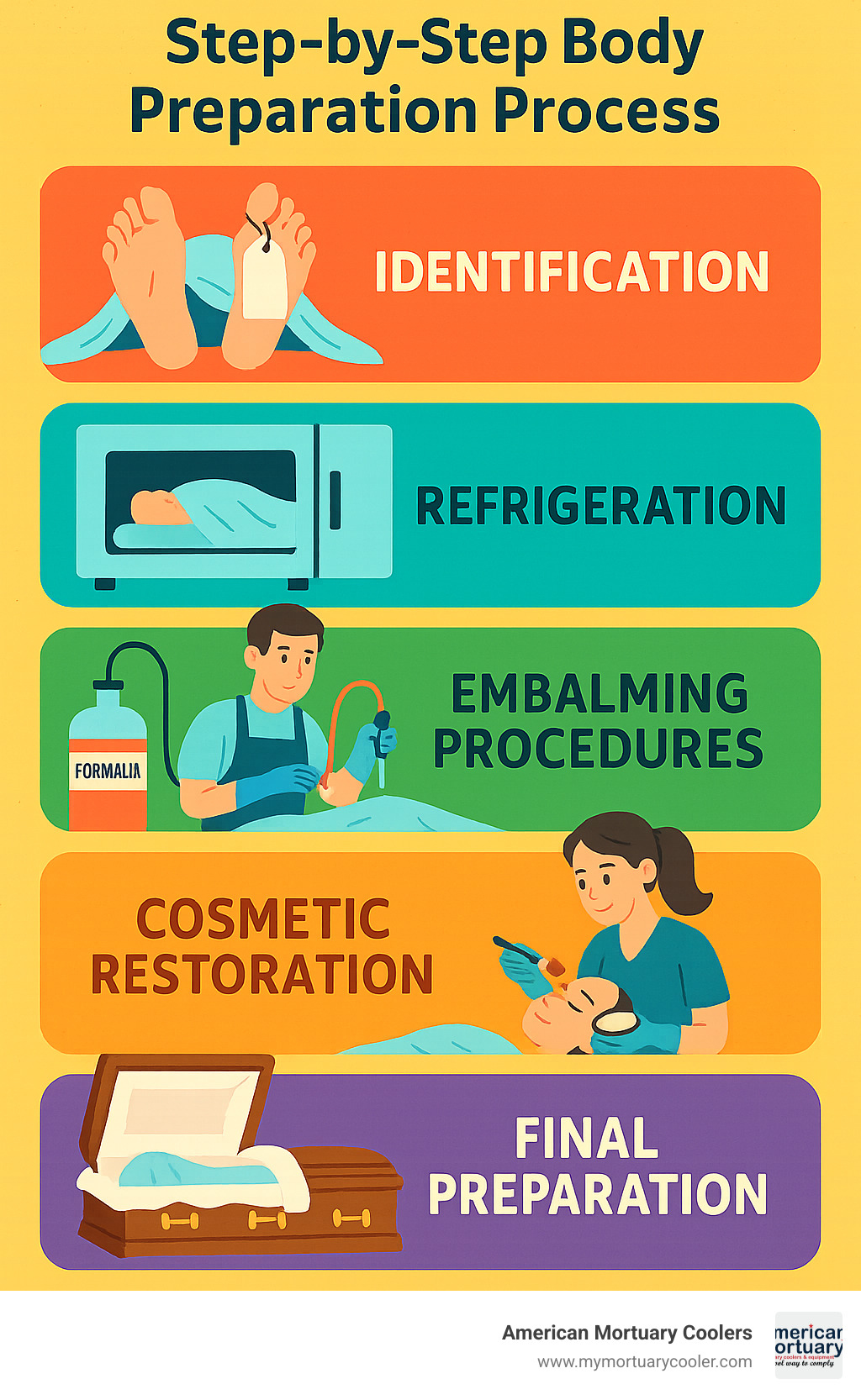
An Essential Guide to Finding Local Mortuary Services Near You
Why Finding the Right Mortuary Services Matters for Your Community
A mortuary is a facility where deceased bodies are prepared, preserved, and stored before burial or cremation. When families face loss, they need reliable local mortuary services that handle their loved ones with dignity and respect.
Key mortuary services include:
- Body preparation and embalming
- Refrigerated storage and preservation
- Coordination with funeral homes
- Transportation and removal services
- Cultural and religious accommodation
The word "mortuary" comes from the Latin mortuarius, meaning "of the dead." First used as a noun in 1865, it describes facilities that bridge the gap between death and final disposition.
Finding quality mortuary services in your area requires understanding what these facilities do and how they differ from funeral homes or morgues. Mortuary staff use specialized equipment - from body lifts with 1000-pound capacity to walk-in refrigeration units - to ensure proper care of the deceased.
As American Mortuary Coolers, we've worked as a national-level mortuary cooler supplier for years, helping funeral homes and mortuary facilities across the country maintain proper body storage conditions. Our experience in the mortuary equipment industry has shown us how the right facility and equipment make all the difference during difficult times.

Understanding Mortuary Services 101
When someone passes away, their body needs proper care and preparation before burial or cremation. That's where mortuary services come in - these specialized facilities handle the deceased with dignity while supporting families during their most difficult moments.
The word mortuary comes from the Latin mortuarius, meaning "of the dead." While the term appeared as an adjective in the 15th century, it wasn't used to describe an actual facility until 1865. This history shows us something important: these places have always been about treating the departed with respect.
More info about the definition and latest research on word origin provide additional context for understanding these essential facilities.
Today's mortuaries serve as the quiet heroes of death care. They make sure every person receives proper treatment, no matter their family's situation or beliefs.
What Is a Mortuary?
A mortuary - sometimes called a mortury by families searching online - is a specialized facility built around three main areas that work together seamlessly.
Cold storage areas keep bodies at the right temperature using walk-in coolers and individual refrigeration units. These systems maintain temperatures between 36-40°F, which prevents decomposition and preserves dignity.
Embalming suites feature stainless steel tables, arterial injection equipment, and drainage systems that meet strict health standards. Licensed embalmers work in these sterile rooms to preserve bodies for viewing and burial.
Viewing rooms offer private, comfortable spaces where families can spend final moments with their loved ones. These rooms are designed to feel peaceful rather than clinical, helping families find closure during their grief.
How a Mortuary Differs From a Funeral Home or Morgue
Many people get confused about the differences between mortuaries, funeral homes, and morgues. Each serves a different purpose in death care.
| Facility Type | Primary Purpose | Licensing | Public Access | Services |
|---|---|---|---|---|
| Mortuary | Body preparation and storage | Funeral service license | Limited, by appointment | Embalming, refrigeration, preparation |
| Morgue | Medical examination and autopsy | Medical examiner authority | Restricted to officials | Autopsy, investigation, identification |
| Funeral Home | Complete funeral services | Funeral director license | Open to public | Ceremonies, arrangements, merchandise |
Mortuaries focus on behind-the-scenes work - preparing and preserving bodies with specialized equipment and trained staff.
Morgues handle medical and legal cases where the cause of death needs investigation. These facilities work with medical examiners and law enforcement.
Funeral homes provide the full experience - from arrangement meetings to ceremonies to selling caskets and flowers.
Main Services Offered
Modern mortuaries have expanded their services to meet changing family needs and cultural preferences.
Embalming remains the cornerstone service that most people think of first. Professional embalmers use specialized chemicals and techniques to preserve bodies for viewing and burial.
Refrigeration services have become equally important as more families choose cremation or need extended storage time. Walk-in coolers and individual refrigeration units maintain proper conditions whether embalming happens or not.
Cremation coordination involves careful preparation including removal of pacemakers and other medical devices that could cause problems during cremation.
International shipping requires specialized expertise for families who need to transport their loved ones across state lines or international borders.
Finding the Right Mortuary Near You: Step-by-Step

When you're searching for a mortuary in your area, it can feel overwhelming during an already difficult time. The good news is that taking a methodical approach makes the process much more manageable.
Start by checking your state licensing boards - every state keeps detailed records of licensed mortuary facilities, and these databases are usually searchable online. State regulations differ quite a bit from place to place, so understanding your local requirements helps ensure you're working with properly licensed professionals.
Online directories from professional associations offer another reliable starting point. These searchable databases often include additional details about services offered and staff credentials that you won't find in basic phone listings.
Don't underestimate the value of reading facility reviews from other families who've used these services. While every situation is unique, these accounts can reveal important details about how facilities treat families during difficult times.
Scheduling facility tours is perhaps the most important step. A personal visit shows you the cleanliness standards, equipment quality, and how staff interact with families. Pay attention to whether the facility feels respectful and well-maintained - these details matter when entrusting them with your loved one's care.
Look for accreditation from recognized professional organizations. These certifications indicate that facilities meet industry standards for equipment, procedures, and staff training. More info about choosing coolers can help you understand what proper refrigeration equipment looks like.
Finally, compare pricing transparently. Reputable facilities provide clear, detailed pricing without hidden fees. Budget considerations are important, but the lowest price doesn't always mean the best value when it comes to caring for your loved one.
What Makes a Mortuary Different From a Morgue?
Many families get confused about the difference between a mortuary and a morgue, but understanding these distinctions helps you know exactly where to go for your needs.
Certified staff make the biggest difference. Mortuary professionals include licensed funeral directors and embalmers who've completed specialized training in body preparation, family counseling, and funeral service regulations. Their focus is on preparing your loved one for burial or cremation while supporting your family through the process.
Public access is another key difference. Mortuaries welcome families by appointment for making arrangements or spending time with deceased loved ones. The atmosphere is designed to be comforting and respectful for grieving families.
In contrast, medical examiner facilities (morgues) serve primarily investigative purposes. They conduct autopsies and determine causes of death, with access restricted to medical professionals and law enforcement. Their equipment and procedures focus on examination rather than preparation for burial.
More info on differences provides more detailed explanations if you'd like to learn more about these important distinctions.
How a Mortuary Supports Grieving Families
Quality mortuaries understand that their role extends far beyond body preparation. They recognize that families need support, guidance, and compassion during one of life's most difficult experiences.
Arrangement meetings happen in comfortable, private settings where families can discuss their needs, preferences, and budget without feeling rushed or pressured. Professional staff guide you through available options, explaining everything clearly and answering questions with patience and understanding.
Many facilities also provide grief resources including referrals to counselors, support groups, and educational materials about the grieving process. They often maintain relationships with local mental health professionals, chaplains, and other support specialists who understand what families are going through.
Aftercare services continue long after the funeral ends. This might include help with death certificates, insurance claims, and memorial planning. Some facilities offer ongoing grief counseling programs or support groups where families can connect with others who've experienced similar losses.
The best mortuaries recognize that every family's situation is unique, and they adapt their approach accordingly. Whether you need immediate services or are planning ahead, they should make you feel supported and cared for throughout the entire process.
Inside the Mortuary: Equipment, Staff, and Processes

Walking into a mortuary for the first time can feel overwhelming, but understanding what happens behind the scenes helps families appreciate the professional care their loved ones receive. These facilities operate like well-orchestrated medical environments, where specialized equipment and trained staff work together to provide dignified care.
The backbone of any quality mortuary operation starts with body lifts capable of handling up to 1000 pounds. Equipment like the Ultimate 1000 Lift™ has been refined over 50 years of use in funeral homes, morgues, and hospitals worldwide.
Walk-in refrigeration units maintain the critical temperature range of 36-40°F that preserves bodies properly. You'll find these stainless steel units equipped with temperature monitoring systems and backup power connections.
The preparation areas house embalming machines including Portiboy systems and arterial injection equipment that enable professional body preparation. Modern facilities also rely on hydro aspirators and specialized drainage tools designed for efficiency and cleanliness.
OSHA safety regulations govern everything from ventilation systems to personal protective equipment. Staff members wear appropriate PPE when handling potentially infectious materials.

At American Mortuary Coolers, we've delivered equipment to facilities across Tennessee, Georgia, Illinois, South Carolina, Texas, California, New York, and Pennsylvania. Through these partnerships, we've learned that proper equipment maintenance and staff training make the difference between a good facility and an exceptional one.
More info on equipment provides comprehensive details about what makes a mortuary facility truly professional.
Equipment Rundown
The Ultimate 1000 body lift system represents five decades of engineering refinement. These lifts include wireless remote controls and integrate seamlessly with removal vehicles, making transport safer and more dignified.
Walk-in coolers serve as the heart of preservation operations. These units feature stainless steel 304 construction that resists corrosion and cleans easily. Temperature monitoring systems sound alarms if conditions drift outside acceptable ranges.
Embalming equipment includes arterial injection systems that carefully introduce preservative fluids, while cavity treatment tools address internal preservation needs. Modern trocars and aspirator systems enable thorough preparation while maintaining sterile conditions.
Autopsy tables constructed from medical-grade stainless steel provide appropriate surfaces when post-mortem examinations are required.
Roles & Responsibilities of Mortuary Staff
Behind every well-run mortuary stands a team of professionals with distinct but complementary roles.
Funeral directors hold state licenses and coordinate the entire operation. They're often the first person families meet, guiding them through difficult decisions while ensuring all legal requirements are met.
Licensed embalmers complete specialized education focused specifically on body preservation techniques. They hold separate professional licenses and often apprentice for years before working independently.
Removal technicians handle the delicate responsibility of transporting deceased individuals from hospitals, homes, or accident scenes to the mortuary facility.
Administrative staff coordinate schedules, maintain detailed records, and handle family communications with sensitivity and professionalism.
Body Preparation Workflow
Professional mortuary operations follow carefully established protocols that prioritize both dignity and safety at every step.
Identification procedures begin the moment someone arrives at the facility. Staff verify identity using multiple methods including identification tags, official documentation, and family confirmation.
Immediate refrigeration preserves bodies using walk-in coolers or individual refrigeration units. Proper temperature control halts decomposition and maintains dignity while families make arrangements.
Professional embalming typically requires 2-4 hours depending on individual circumstances. The process involves arterial injection of preservative chemicals that replace body fluids, ensuring preservation for viewing and burial.
Cosmetology services restore the natural appearance families remember. Professional cosmetologists apply makeup, style hair, and position features to help loved ones look peaceful and familiar.
Final casketing procedures complete the preparation process. Staff position bodies appropriately in selected caskets, including any personal items families have requested.
Modern Trends, Cultural Sensitivity & Green Options in Mortury Care

The mortuary industry is experiencing a quiet revolution. Families today want more options that reflect their values and beliefs, whether that's caring for the environment or honoring cultural traditions. As a result, modern mortuary facilities are adapting to serve these evolving needs while maintaining the dignity and respect that has always been at the heart of death care.
Human composting represents one of the most significant shifts in body disposition. This process, also called natural organic reduction, transforms bodies into nutrient-rich soil over 30-60 days. While some critics question whether it's truly as green as advertised, many families find comfort in the idea of their loved ones becoming part of the earth again.
Alkaline hydrolysis, often called water cremation, offers another eco-friendly alternative. This process uses water and alkali solutions to break down the body naturally, producing less environmental impact than traditional flame cremation. The process takes about 3-4 hours and leaves families with clean, white bone fragments similar to traditional cremation.
These changes aren't just about the environment, though. Families are also seeking more personalized, culturally sensitive care. Death doulas now work alongside mortuary staff to provide emotional and spiritual support throughout the dying process and beyond. This collaboration helps ensure that families receive comprehensive care during one of life's most difficult transitions.
More info about embalming explains how traditional preparation methods work alongside these modern alternatives.
Innovations in Mortuary Science
Technology is changing how mortuaries operate, making processes more efficient and accurate while improving family experiences. Recomposition vessels are specially designed containers that create the perfect environment for human composting. These vessels maintain optimal temperature, moisture, and oxygen levels to facilitate natural decomposition.
Digital memorials bridge the gap between traditional funeral services and our connected world. Families can now create online tributes that last forever, sharing photos, stories, and memories with loved ones around the globe. Some facilities even offer live streaming services, allowing distant family members to participate in viewings and services.
RFID tracking systems might not sound very personal, but they're revolutionizing mortuary operations behind the scenes. These small electronic tags ensure that every body is properly identified and tracked throughout the entire preparation process. This technology virtually eliminates mix-ups and gives families peace of mind that their loved one is receiving proper care.
Serving Diverse Beliefs
America's growing diversity means mortuaries must understand and respect a wide range of cultural and religious practices. This isn't just about being politically correct—it's about providing meaningful care that honors how different communities approach death and mourning.
Religious washing facilities accommodate Islamic, Jewish, and other faith traditions that require ritual purification before burial. These specialized areas provide privacy and the proper equipment needed for these sacred ceremonies. Many facilities now designate specific rooms and times for these practices.
Kosher caskets must meet strict religious requirements regarding materials and construction. They're typically made entirely of wood with no metal parts, allowing the body to return to the earth naturally. Some mortuaries keep these caskets in stock, while others work with specialized suppliers to ensure quick availability.
Vigil spaces recognize that some cultures maintain traditional watching periods with their deceased loved ones. These comfortable areas allow families to spend extended time together, often overnight, as part of their mourning traditions. The spaces include seating, appropriate lighting, and sometimes kitchen facilities for families keeping long vigils.
Environmental Considerations
Environmental consciousness is reshaping the mortuary industry in practical ways. Green embalming fluids now offer formaldehyde-free alternatives that provide effective preservation while reducing environmental impact. These plant-based formulations appeal to families who want traditional viewing and burial without the environmental concerns.
Energy-efficient coolers represent a significant advancement in mortuary equipment. Modern refrigeration units use improved insulation and efficient compressor systems that can reduce electricity consumption by 30-40% compared to older models. At American Mortuary Coolers, we've seen facilities significantly reduce their operating costs while maintaining proper body storage conditions.
Biodegradable urns complete the circle for environmentally conscious families choosing cremation. These urns dissolve naturally when buried or scattered in water, leaving no permanent environmental impact. Options range from simple cardboard containers to beautiful urns made from salt, sand, or other natural materials.
The mortuary industry's evolution reflects broader changes in how Americans think about death, family, and environmental responsibility. By embracing these trends while maintaining professional standards, modern mortuaries serve families more completely than ever before.
Frequently Asked Questions about Mortury Services
When families face the loss of a loved one, questions about mortuary services naturally arise. These are the most common concerns we hear from families across the country, based on our years of experience supplying mortuary equipment to facilities nationwide.
How long can a body stay in a mortuary cooler?
The answer might surprise you - bodies can remain safely stored in professional mortuary coolers for several weeks or even months when properly maintained. Walk-in refrigeration units that maintain steady temperatures between 36-40°F effectively halt decomposition and preserve bodies for extended periods.
Several factors influence exactly how long storage is possible. The condition of the body at the time of death plays a role, as does the efficiency of the refrigeration system itself. We've seen families need extended storage time while waiting for relatives to travel from overseas, or when legal matters require delays.
State regulations also come into play - some jurisdictions have specific rules about storage duration. Most professional mortuaries can accommodate extended storage needs, though they may charge additional fees for longer-term refrigeration services.
From our experience supplying coolers to facilities across Tennessee, Texas, California, and other states, we know that quality refrigeration equipment makes all the difference in maintaining proper storage conditions over time.
Is embalming legally required in my state?
Here's something that surprises many families: most states don't actually require embalming for burial or cremation. This common misconception leads many families to believe they must choose embalming when other options might better suit their needs.
Embalming becomes necessary in specific situations rather than as a blanket requirement. Bodies being transported across state lines typically need embalming or refrigeration. Public viewing services often require embalming, though some facilities accept refrigeration as an alternative.
Time delays can trigger embalming requirements in some states. If burial or cremation is delayed more than 24-48 hours, certain jurisdictions may require preservation through embalming or refrigeration. Communicable diseases rarely require embalming, contrary to popular belief.
Refrigeration serves as an acceptable alternative to embalming in most situations. Families choosing immediate burial or direct cremation typically face no embalming requirements whatsoever. This flexibility allows families to make choices based on their beliefs, budget, and preferences rather than legal mandates.
Can I organize a home funeral after mortuary care?
Absolutely! Home funerals remain legal in most states even after professional mortuary preparation. Many families find comfort in bringing their loved one home for private viewing or ceremony following embalming or other preparation services.
Coordination with mortuary staff makes home funerals possible and dignified. Professional facilities can arrange transportation from their location to your home, ensuring safe and respectful delivery. They'll also provide guidance on proper positioning and care during the home viewing period.
State regulations vary regarding body transport and storage at home, so checking local requirements is essential. Most states allow temporary home storage following professional preparation, though time limitations may apply.
Practical considerations include having appropriate space for body positioning, understanding any time restrictions for home viewing, and making arrangements for final disposition following the home service. Many mortuaries work closely with families to facilitate these meaningful home ceremonies.
The combination of professional mortuary preparation with intimate home services offers families the best of both worlds - expert care and personal, private time with their loved one in familiar surroundings.
Conclusion & Next Steps
Finding the right mortuary services comes down to understanding what really matters during one of life's most challenging moments. These specialized facilities do far more than just store and prepare bodies - they provide a bridge between loss and healing, offering families the dignity and respect their loved ones deserve.
Throughout our years serving the funeral industry from our Tennessee base, we've witnessed countless families steer these difficult decisions. The facilities that truly make a difference combine professional expertise with genuine compassion. They invest in quality equipment like walk-in refrigeration systems and proper body lifts, but more importantly, they invest in trained staff who understand that every family's needs are unique.
Planning ahead makes all the difference. When you're not facing immediate grief, you can take time to research licensed facilities in your area, schedule tours to see their equipment and meet their staff, and have honest conversations with family members about preferences and values. This preparation doesn't just help with logistics - it provides peace of mind knowing that when the time comes, you'll have a trusted partner to guide you through.
The mortuary industry continues evolving to serve diverse communities and environmental concerns. Whether your family prefers traditional embalming and burial, green alternatives, or cultural-specific practices, the right facility will accommodate your needs without judgment or pressure.
At American Mortuary Coolers, we see the behind-the-scenes dedication that quality facilities bring to their work. Our custom walk-in and portable refrigeration units serve mortuaries across all 48 contiguous states because we understand that proper equipment forms the foundation of professional care. But equipment alone doesn't create exceptional service - that comes from people who genuinely care about the families they serve.
When evaluating mortuary services, trust your instincts. The right facility will welcome your questions, provide transparent pricing, and make you feel comfortable during facility tours. They'll explain their processes clearly and connect you with appropriate grief resources and aftercare support.
Quality mortuary care extends beyond technical procedures. It's about treating every person with dignity, supporting families through grief, and maintaining the highest standards even when no one is watching. The right facility becomes a trusted partner during your most vulnerable moments.
More info about mortuary body storage provides additional insights for those interested in understanding the technical aspects of proper body preservation and storage.
Whether you're planning ahead or facing immediate need, take comfort knowing that professional, compassionate mortuary services are available in your community. The right facility will honor your loved one's memory while supporting your family through the journey ahead.



